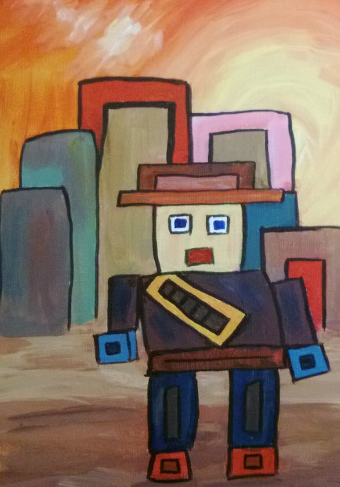Spadina Literary Review — edition 18 page 13
fiction

showdown by brendan mchale (detail)
Masquerade
by Thomas Elson
After four days under intense scrutiny, nine days in isolation and ten days under observation, Merle Rector, recently given phone privileges, dialed his wife for the third time that day. He had shown no emotion during her single visit — better to remain stoic, keep his feelings hidden. Safer that way.
Merle’s call went quickly to voice mail. He waited, then said into the phone, “I’m getting out in two days. Call me.” His flat, inert voice mirrored the level of medication in his system.
Rachel had been talking with her history students at school when she heard the distinct military-march ringtone Merle had insisted she install on her phone. She walked over to the phone, shoving her hair back with three fingers of her left hand. She squinted, pressed the mute button without listening to Merle’s message, and returned to her students. She was angry at the walls, cranky at the chairs, and irate at herself for her indecisiveness.
It was over three weeks since she had taken him to hospital.
Merle had been in his home office in the basement, sitting behind his chipped metal desk, working on his plan. He had a plan to dig down two more floors, to end up with a tri-level basement. It was the project that Rachel considered his one true love, the central preoccupation of his life. As now, the first level would be his office, then there would be a middle level for a living area with a master bedroom and bathroom. He unilaterally decided the lowest floor would be a workout area for Rachel. Half of it anyway. The other section would be his shooting range. This whole structure was to sit beneath their one-bedroom bungalow, surrounded by a wall of trees in front of a six-foot cinderblock barrier.
That day the entire house had been redolent of the fried foods and warm pastries Rachel had prepared. “They’re not for you, they’re for the party you don’t want to go to,” she told him, patting his left shoulder, her eyes cast to the right, her lower lip slanted down as if undecided.
Merle, his shadowed face cast in an abiding scowl, did not look up. He stared blankly at the wall. Generally he was comfortable here, surrounded by his combat biographies, books on the Maginot Line, books on the World Wars, magazines from the National Rifle Association and the Ayn Rand Institute. He looked for the rifle, no longer loaded, he kept tilted against his desk like a talisman. He exhaled, and promptly forgot where he was. Episodes like this recurred more and more frequently during the past two years.